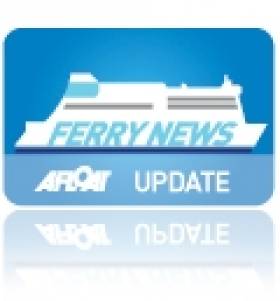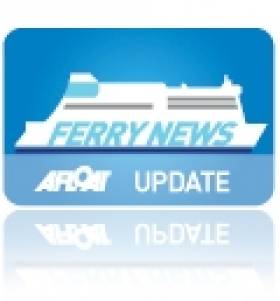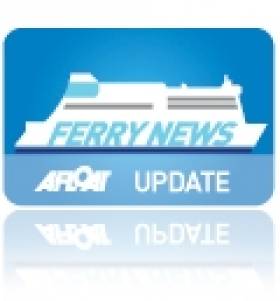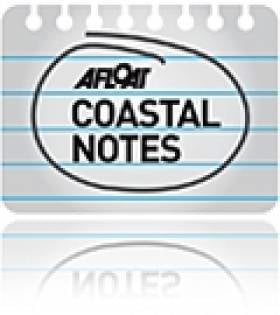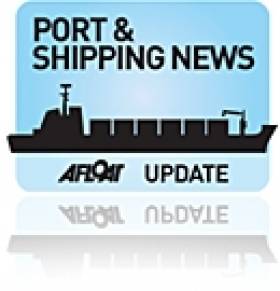Displaying items by tag: Foyle Venture
Foyle Ferry Returns to Service
#FERRY NEWS – After a gap of six months the Greencastle-Magilligan ferry service across Lough Foyle reopened over the St. Patrick's weekend, writes Jehan Ashmore.
The return of the 10-minute cross border route, which offers an alternative to a road journey of nearly 80kms /50 miles was announced by Donegal County Council and Limavady Borough Council.
As previously reported on Afloat.ie, the route operated by Lough Foyle Ferry Company is a joint initiative of the two councils and for the remainder of this month the service will be running to a weekend-only schedule.
Sailings however are to increase to a regular daily service, subject to weather conditions, between 1st April-30th September.
For more information visit www.loughfoyleferry.com
Donegal-Derry Ferry Route Closes
According to the Lough Foyle Ferry Company website, the directors sincerely hope that the suspension of the service will be temporary and look forward to re-commencing operations in early 2012.
The 10-minute crossing served by the 300-passenger / 44-vehicle capacity Foyle Venture (photo) provided year-round sailings. During the summer months the schedule was increased to a continuous shuttle-service as it provided a convenient short-cut for Northerners heading to Donegal.
Motorists could save nearly 80 kms (50 miles) by travelling across the Inishowen Peninsula instead of having to drive through London/Derry. In its third year of operations, the company carried its one-millionth passenger and since then the route has exceeded 2m passegers.
Lough Foyle Ferry Service To Cease
A notice on each pier says the Lough Foyle Ferry Company regrets the service will be suspended from the close of business on Sunday, October 2nd. The notices say directors of the company hope the suspension will be temporary, and they look forward to recommencing operations early in 2012.
For a photo of the ferry that once served on the Shannon (Killimer-Tarbart) service as Shannon Willow click HERE. Note in the background is the veteran cruiseship Princess Daphne at anchor in Lough Foyle. To read more about the ferry service visit www.loughfoyleferry.com/main.htm
Ireland’s Countdown to Rocket-Ship Launch!
The RLM which stands for "Ridiculously Large Missile" is the second-largest civilian rocket ever launched in Ireland. In fact the organisers have built a larger one called the BFM: that's "Big Fat Missile".
The spectacular event has previously taken place on the last Sunday of each month since April. Today's launch will be the fifth and final blast-off of this year's rocket season.
Returning to earth, the museum located in the old coastguard station overlooks Greencastle harbour, which has one of busiest fishing fleets in Ireland.The maritime museum and its planetarium will also be open today. For summertime opening hours and admission fees information Tel: (074) 9381363 or visit http://www.inishowenmaritime.com/about.shtml
Greencastle is also conveniently connected by a 15-minute car-ferry service across Lough Foyle to Magilligan in Co. Derry. The route is served by the Foyle Venture, for ferry times and fares visit www.loughfoyleferry.com/
Donegal Ferry Services Under Review
The cross-border service is funded by Donegal County Council and Limavady Borough Council. The route in recent years has experienced an unfavourable exchange rate, increased cost of fuel, poor weather, a depressed tourism market sector and notably reduced construction traffic, contributing to a sharp decline in demand. In the current climate the local authorities may find it difficult to provide funding as they scale back on budgets.
Record levels in 2005/2006 saw traffic reach 106,179 vehicles and 302,740 passengers. Such was the success of the service annual subsidies for 2008 and 2009 were not required. According to the latest 12-monthly traffic figures for June 2009-June 2010, vehicle volumes dropped to 52,669 and passengers levels have decreased more than halve to 149,455.
The 10-minute route is operated by the 44-vehicle capacity Foyle Venture which served the Kilimer-Tarbert route for the Shannon Ferry Co. The mid-west estuary ferry was replaced by newbuild Shannon Breeze in 2000 and later sold to Lough Foyle Ferry Co.
When the Lough Foyle route began operations in 2002, the service received a subvention of €108,000 each from the local councils. Over that timeframe, the route has received a total funding of €500,000 from Donegal County Council.
In 2009, the two local authorities agreed to provide a €200,000 subvention, but this runs out in March 2011. An application has also been submitted to the Special EU Programmes Body for funding.
On the west side of the Inishowen Peninsula is the Bunbcrana-Rathmullan service, which is also in doubt if a subsidy from Donegal County Council cannot be maintained. The Lough Swilly route started in 2004 and is served by the 20-vehicle capacity Foyle Rambler, a former German river-ferry. The north-west ferry route takes 25-minutes and recorded 15,000 passengers at its peak.
In busier times, tourists from the North, instead of passing through Derry city, used the 'land-bridge' routes across the Inishowen Peninsula to reach holiday-homes and popular seaside resorts throughout Co. Donegal.



























